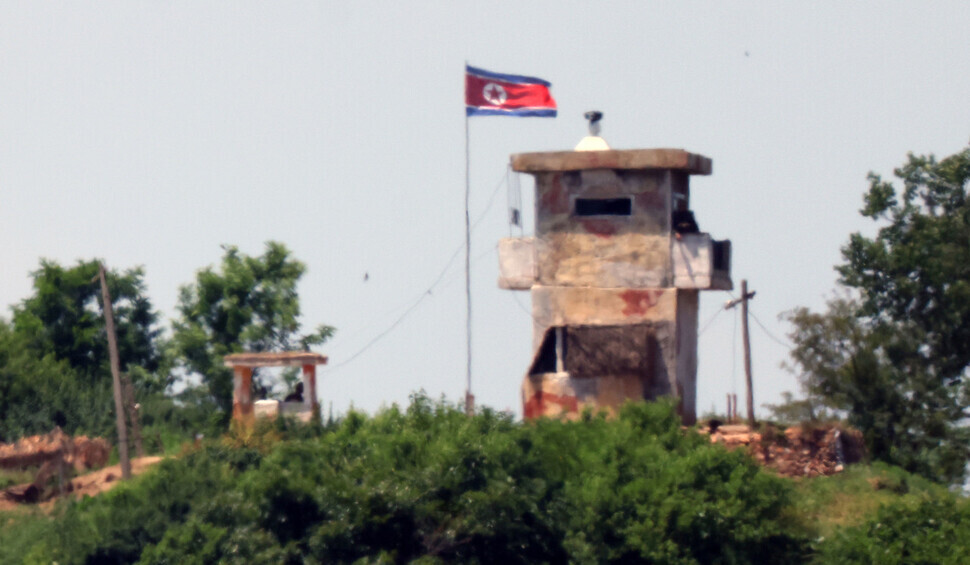hankyoreh
Links to other country sites 다른 나라 사이트 링크
[Editorial] Yoon prioritizes his administration over South Korea’s safety once again

President Yoon Suk-yeol’s suspension of an inter-Korean military agreement from 2018 has steered the two Koreas into precarious waters, as the buffer-creating military accord has been a key safeguard preventing military conflict between the two countries for the past six years.
For a leader who has been unable to prevent North Korea’s provocative trash-filled balloons, this is a risky response that endangers those on the Korean Peninsula by pushing the two Koreas to the brink of military conflict. We are yet to see if this move will earn the support of the US and Japan, whose opinions Yoon values immensely.
The Yoon administration should rescind this decision, which is being criticized as jeopardizing the entire country for the benefit of the administration.
The only method of finding a solution to nip any conflicts in the bud involves the two Koreas setting down their distrust toward one another and engaging in dialogue to discuss ways of reducing threats to both parties.
On Tuesday, Yoon kept his word and approved his Cabinet’s motion to indefinitely suspend the validity of the comprehensive inter-Korean military agreement. It has been six years since the confidence-building pact was signed in September 2018 in Panmunjom. The Ministry of National Defense issued a statement shortly afterward, stating its intent to “restore all military activities of the South Korean military in the western and northwestern areas of the Military Demarcation Line, areas which had previously been subject to restrictions.”
This measure allows the military to conduct artillery exercises within 5 kilometers of the Military Demarcation Line — the official border between the Koreas — oversee field training exercises at regiment levels and higher, and resume loudspeaker propaganda broadcasts along the border.
The government is choosing a full-on confrontation, even though North Korea expressed its intent to stop sending trash-filled balloons into the South in a statement issued on Sunday. It’s only natural for the opposition to criticize the administration, as seen in how Park Chan-dae, the floor leader of the Democratic Party, scathingly asked if the government “wants to go back to the days when artillery shells were flying across the armistice line.”
When it comes to conflicts between nations, it is easy to provoke the other party, but much harder to know when to step back. Even now, we are faced with a situation in which the North Korean defector organization Fighters for North Korea is declaring that it will continue to send balloons carrying leaflets to North Korea, which only means that North Korea will come up with measures to provoke us, which will then lead our military to respond to such provocations as it sees fit.
If we are not careful, both Koreas will be annihilated. Yoon, whose approval ratings have plummeted to 21 percent, is putting the entire country at risk for his administration’s short-term gain.
The US and Japan seem unwilling to align themselves with Yoon’s attempts at confrontation with North Korea.
When asked on Monday (local time) what measures the US and South Korea would take in response to North Korea’s trash-filled balloons, US Department of State spokesperson Matthew Miller merely condemned North Korea’s actions as “a disgusting tactic — irresponsible, childish — and it should come to an end.” Miller met most of the follow-up questions with laughter.
The same can be said for Japan, which has always overreacted to North Korea’s military provocations.
Chief Cabinet Secretary Yoshimasa Hayashi said at a briefing on Tuesday that while Japan “respects South Korea’s judgment,” it is important to “prevent the situation from worsening by increasing tensions between the two Koreas.” In other words, he is asking South Korea not to stoke tensions.
Please direct questions or comments to [english@hani.co.kr]

Editorial・opinion
![[Editorial] It’s time for us all to rethink our approach to North Korea [Editorial] It’s time for us all to rethink our approach to North Korea](https://flexible.img.hani.co.kr/flexible/normal/500/300/imgdb/original/2024/0621/7517189559819182.jpg) [Editorial] It’s time for us all to rethink our approach to North Korea
[Editorial] It’s time for us all to rethink our approach to North Korea![[Column] Why empty gestures matter more than ever [Column] Why empty gestures matter more than ever](https://flexible.img.hani.co.kr/flexible/normal/500/300/imgdb/original/2024/0619/7217187833478369.jpg) [Column] Why empty gestures matter more than ever
[Column] Why empty gestures matter more than ever- [Editorial] Seoul’s part in N. Korea, Russia upgrading ties to a ‘strategic partnership’
- [Column] The tragedy of Korea’s perpetually self-sabotaging diplomacy with Japan
- [Column] Moon Jae-in’s defense doublethink
- [Column] S. Korea-China cooperation still has a long way to go
- [Editorial] Seoul must use tact and diplomacy to check deepening Russia-NK ties
- [Editorial] Thorough audit, evaluation of oil test drilling are needed
- [Editorial] Yoon prioritizes his administration over South Korea’s safety once again
- [Column] The monumental shift in N. Korea’s nuclear program that never happened
Most viewed articles
- 1[Editorial] It’s time for us all to rethink our approach to North Korea
- 2North Korea’s real motive for publishing the full text of new treaty with Russia
- 3[News analysis] N. Korea’s new pact with Russia is ‘mirror image’ of Yoon’s alliance with US
- 4Seoul hints at lethal weapons aid to Ukraine to put pressure on Russia
- 5Seoul decries N. Korea-Russia mutual defense pact as ‘absurd’
- 6Hot weather hat trick to send the mercury soaring in Korea
- 7[Editorial] Seoul’s part in N. Korea, Russia upgrading ties to a ‘strategic partnership’
- 8[Editorial] Fortified N. Korea-Russia ties should be a wakeup call for Seoul
- 9Putin, Kim pledge ‘mutual assistance’ in event of outside aggression
- 10[Photo] K-pop: For everyone, everywhere